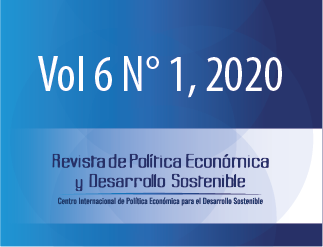Institutional heritage and development
An analysis from historical-institutional categories
DOI:
https://doi.org/10.15359/peds.6-1.3Keywords:
History, Institution, Religion, Economic Development, Social DevelopmetAbstract
The objective of this article is to study the institutional historical relationship of a group of selected countries and their stage of development. It is based on the premise that the process of institutional development should be understood as a continuum, not as a future state nor as something concluded in the past. The phenomena observed today are the result of their continuous evolution, their past and history. From the second half of the twentieth century to the present, institutional development has often been simplified into policy prescriptions and institutional transformations that obviate the complexity of the process. To address this approach, methodologically four categories of analysis are proposed, namely: Protestant and Catholic countries, Catholic colonies subdivided
into Spanish and French, and “new Europes.” These are compared using three indicators: the Human Development Index, gross domestic product growth rates, and Ease of Doing Business rankings. This article demonstrates how the historical development of countries can determine the institutionality they possess in the present, along with the performance of these, taking into account the antecedents of the Middle Ages and the beginnings of modernity in
the sixteenth century. It concludes that institutional legacies are evident in the present results of several economies and that these should be taken into account when planning and implementing public policy.
References
Acemoglu, D., Johnson, S. & Robinson, J. (2001). The Colonial Origins of Comparative Development: An Empirical Investigation. American Economic Review, No. 91 (2001), 1369-1401. Recuperado de: https://www-jstor-org.una.idm.oclc.org/stable/2677930
Acemoglu, D. & Robinson, J. (2012). Por qué fracasan los países. Barcelona, España: Centro Libros PAPF, S.L.U.
Argemi de Abadal, L., Perdices de Blas, Luis, Casares Ripol, et al. (2008). Historia del pensamiento económico. Madrid: Editorial Síntesis.
Brue, S. & Grant, R. (2008). Historia del pensamiento económico. México: Cengage Learning.
Crespo, J. (2012). Imperios: Auge y declive de Europa, 1492-2012. Barcelona, España: Galaxia
Gutemberg, S.L.
Dussel, E. (2009). Ética de la liberación en la edad de la globalización y la exclusión. Madrid, España: Editorial Trotta, S.A.
Ekelund, R. & Hébert, F. (2006). Historia de la teoría económica y su método. México D.F: McGraw-Hill Interamericana Editores S.A.
Fromm, E. (2015). El miedo a la libertad. México: Ediciones Culturales Paidós, S.A.
Hegel, F. (1831). Introducción general y especial a las “Lecciones sobre la filosofía de la historia universal”. Madrid, España: Alianza Editorial S.A.
Mankiw, G. (2013). Macroeconmía. Barcelona, España: Antoni Bosch editor, S.A.
Marx, K. (2014). El capital I: crítica de la economía política. México: Fondo de Cultura Económica.
McCormack, G. (2018). Why ‘Doing Business’ with the World Bank May Be Bad for You.
European Business Organization Law Review, 19(3), 649-676. https://link-springer-com.una.idm.oclc.org/article/10.1007%2Fs40804-018-0116-4
Millán, J. (1964). Compendio de Historia Universal. Buenos Aires, Argentina: Editorial Kapelusz.
North, D. & Weingast, B. (2015). Constituciones y compromiso: La evolución de las instituciones públicas gubernamentales en la Inglaterra del siglo XVII. THĒMIS-Revista de Derecho, 36 (1997); 213-231. Recuperado de: http://revistas.pucp.edu.pe.una.idm.oclc.org/index.php/
themis/article/view/11739/12305
Pacheco, F. (2016). Introducción a la teoría del Estado. San José, Costa Rica: Editorial Universidad Estatal a Distancia.
Phillip, C. (2011). Antropología cultural. México: McGraw-Hill Interamericana Editores, S.A.
Gide, C. & Rist, C. (1949). Historia de las doctrinas económicas. Buenos Aires, Argentina: Editorial Depalma.
Schwanitz, D. (2016). La cultura. Barcelona, España: Penguin Random House Grupo Editorial S.A.U.
Tang, Yi Shin (2017). The International Politics of Legal Reforms: Hard Bilateralism, Soft Multilateralism and the World Bank’s “Doing Business” Indicators. Revista Brasileira De Política Internacional, 60(1). DOI: https://doi.org/10.1590/0034-73292017001017
Taylor, O. (1965). Historia del pensamiento económico. Buenos Aires, Argentina: Tipográfica Editora Argentina S.A.
Weber, M. (2007). Ética protestante. Buenos Aires, Argentina: Gradifco, S.R.L.








